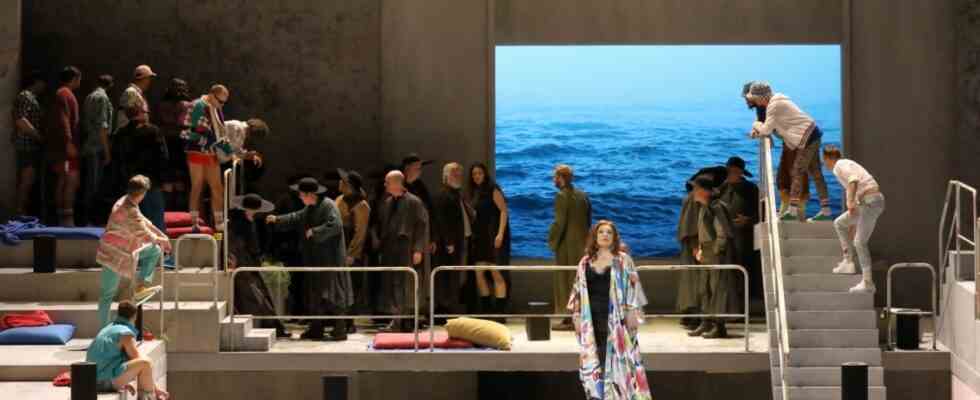At the end of the applause, the chorus unrolls. Before that, in a black outfit and immobile like an oratorio, they have spent five hours in the Bavarian State Opera sung the Ukrainian flag. This is all the more astonishing since these fabulous singers had just preached “eternal hate”, “bitter war” and “bloodbath” in the finale. why? Because of a trifle. Because the Carthaginian boss Didon was abandoned by the Trojan boss Aeneas, which is bad enough, but according to today’s understanding would not justify a war. But the ancients knew otherwise and better. The Trojan War, which is what Hector Berlioz’s mega-opera “Les Troyens” is about, breaks out because of a woman’s story, also because of a trifle. This message, which is quite obvious at the moment, is definitely getting through in Munich: that war, rape, murder and destruction do not require any great circumstances or justifications.
But there is also Daniele Rustioni, born in Milan in 1983 and the house’s first guest conductor and a magician. Under his guidance, the state orchestra weaves the finest veils of sound, it chisels out rhythms of elegance and seduction, it lets the polyphony, which is often grounded in disruptive maneuvers, appear like a living being. It also suggests to the listener that chords are not just sounds, but can also be erotic and fragrant. It’s been a long time since there was so much synaesthesia in Munich. Rustioni and his co-magicians make it clear at every moment that Berlioz composes quite dedicatedly and with catchy numbers against the martial libretto he wrote himself after Virgil’s state-supporting “Aeneid”, that he himself lends refinement and lasciviousness to the marches and death music. The text, however, is largely non-war-critical to glorifying. This gives food for thought, as does the fact that the best and most influential texts from antiquity such as “Iliad”, “Odyssey”, “Orestie” and “Aeneid” from antiquity sing about the Trojan War: literature for men.
So Enée sings too – Gregory Kundy has a trumpet-like tenor that weakens in its tenderness – to his son: “I’ll only teach you the trade of war and respect for the gods.” A few score pages further on, however, this pedagogical hulk conjures up peace, magic and the “Night of Drunkenness”. People are deeply contradictory, Berlioz also claims this when composing, the delicate and the destructive can live without contradiction in the same breast. And the women?
Why does Didon, shaken by her amour fou, not simply go away with Enée, but to her death?
“Les Troyens” tells the story of two emancipated, working women who are damaged by love and who commit suicide. Cassandre, Marie-Nicole Lemieux is strict and serious, works as a fortune teller, but no one takes her warnings seriously. Not even her lover Chorèbe, den Stephane Degout sings with a wonderfully dazzling and sustainable baritone, present, unobtrusive, noble, erotic. Degout is by far the best singer of this evening. When the marauding Greek mercenaries storm Troy, Cassandre murders himself with several other women, the first part, freedom or death, ends so horribly.
Didon on the other hand – Ekaterina Semenchuk stepped in just a few days ago and triumphed, like Gregory Kunde, with clear and loud tones – Karthago founded her Didon. Directed by Christophe Honoré, this is a feel-good paradise, especially for gay men. Explicit little films full of homoerotic love then outrage some in the audience. Men make love here in Carthage, war in Troy, and the Trojan Enée spends a few pleasant hours with the Carthaginian Didon. Then he, in turn, goes to found a city, Rome, that is the divine mandate, duty comes before love. But why doesn’t Didon, shaken by her amour fou, simply go away with him, but like Cassandre to her death?
“Le Troyens” is full of contradictions. Christophe Honoré, who became known in France as a children’s book author, filmmaker and theater director, doesn’t even bother to clear them up. He simply lets them coexist with loving disinterest. Katrin Lea Tag provided him with the foundations of a concrete bunker, which once housed Troy, which had been devastated by war, and then Carthage’s enclosed garden of pleasures. The fugitive Trojans wander around as a troop of exiled Jesuits who like to massacre the “disgusting horde of Africans” (O-Ton Berlioz libretto). The soloists do all the uninspired gestures and gaits that the absence of a guide suggests. Only in the final picture does the wild passion for singing arise, which, as always, catches the eye. Without forgetting that this evening, in its openness, above all poses questions to the audience: How do you feel about war, love and that of your high culture?

